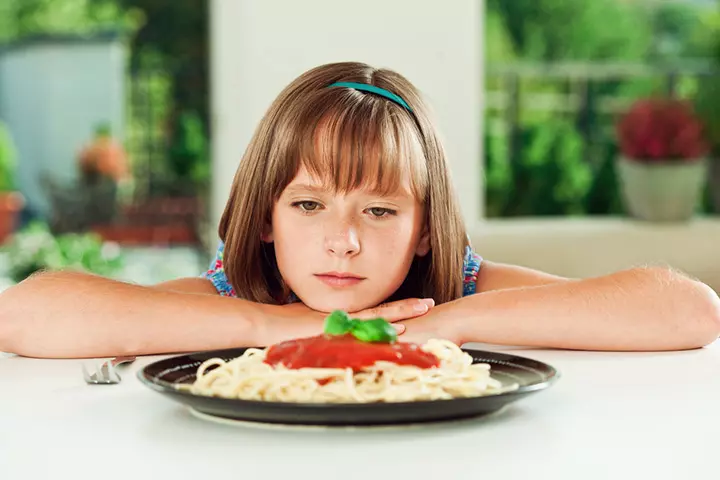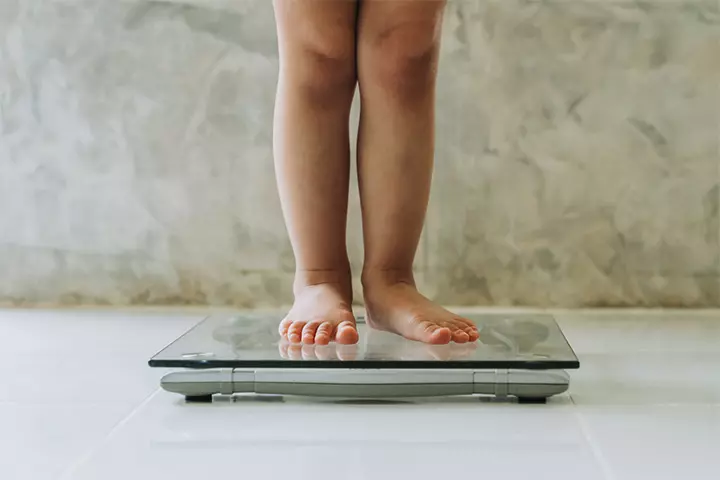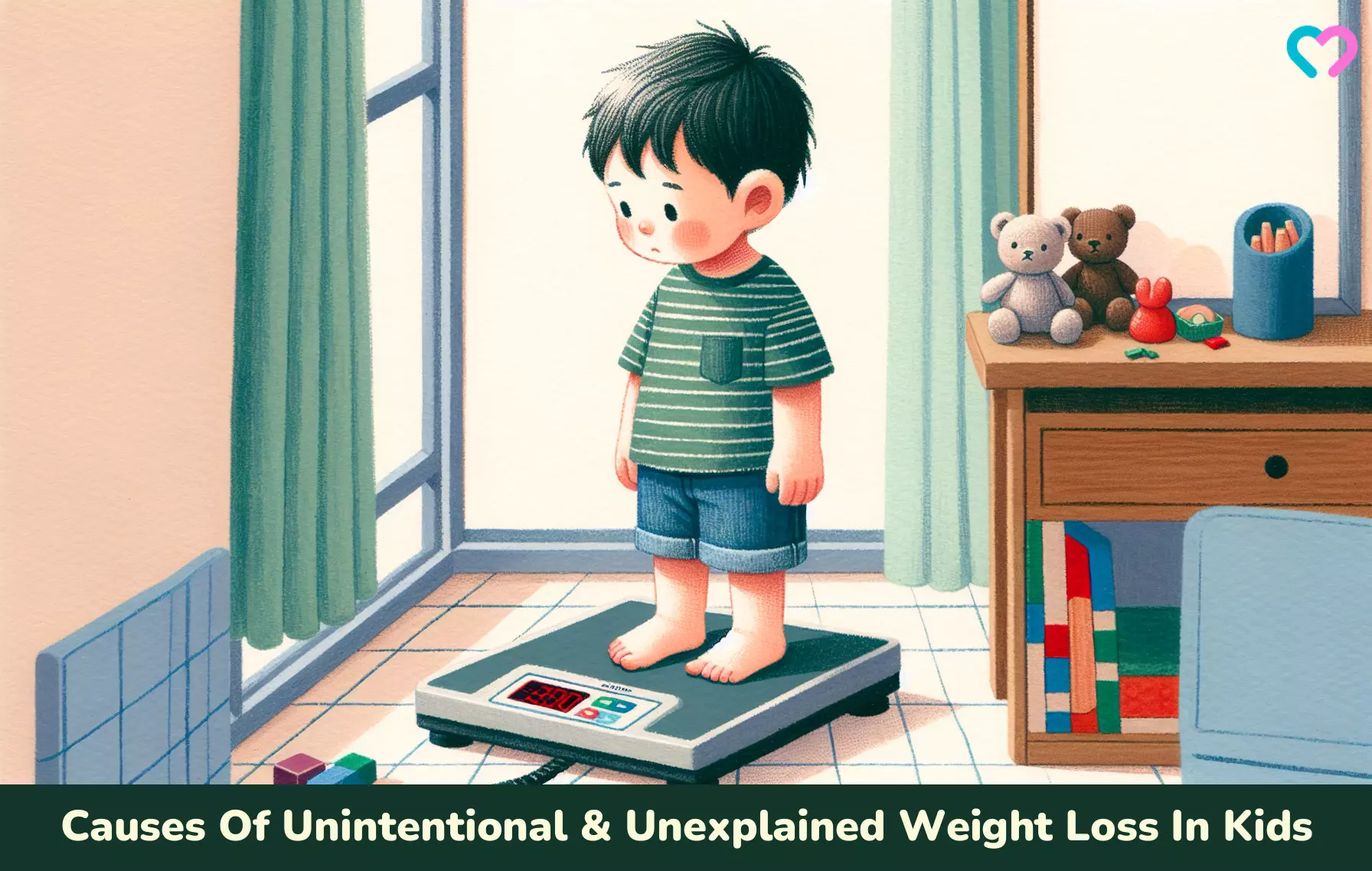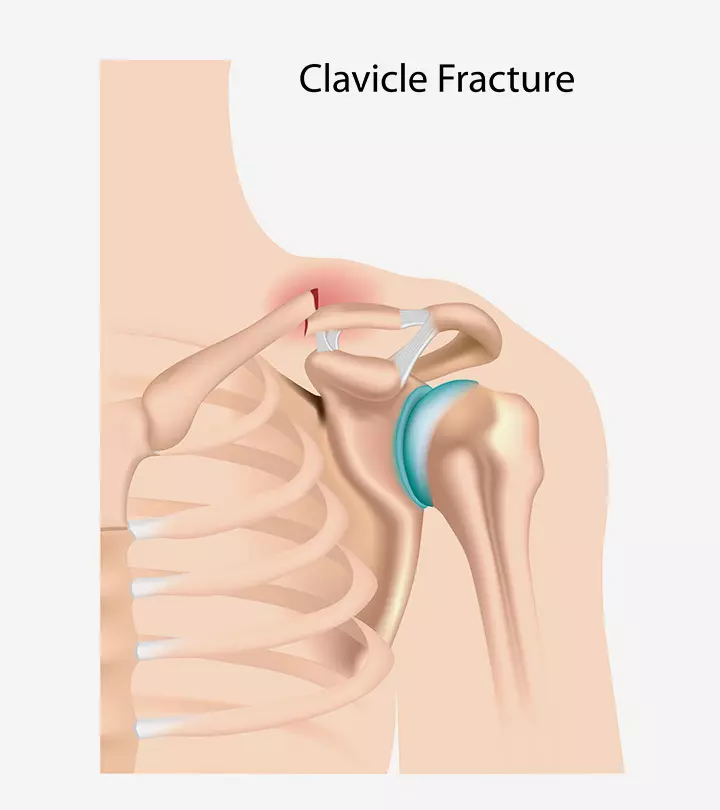
Image: Midjourney/ MomJunction Design Team
Weight loss in kids, particularly unintentional weight loss, can be caused by several factors. Weight loss is when the body loses fats, muscle mass, and fluids, leading to total loss of body mass. Parents may consider intentional weight loss for their overweight or obese child under pediatric guidance. However, unintentional weight loss is abrupt and occurs due to underlying reasons. The causes for unintentional weight loss in kids are usually benign, manageable, and temporary. However, if the child shows other accompanying symptoms, such as sudden loss of appetite and vomiting, it is good to consult a doctor to avoid potential complications. In this post, we present the various reasons behind weight loss in children, symptoms of abnormal weight loss, and how to manage weight loss healthily.

Key Pointers
- Poor eating habits, short-term illnesses, stressful events, or eating disorders are common causes of unintentional weight loss in children.
- Loss of appetite, diarrhea, lack of energy, and fainting can often be associated with unintentional weight loss.
- It is important to diagnose and treat unintentional weight loss in children to avoid complications such as anemia, bone weakness, and growth regressions.
Possible Causes Of Unintentional Weight Loss In Children
Weight fluctuations among children are common and mostly benign. If your child loses a few pounds over time, you shouldn’t worry. Rapid development, puberty, and exam stress could be the reasons for it. Dr. Wendy Schofer, pediatrician from Virginia, explains, “Normal variations in weight can occur due to acute illness, life changes, or natural body changes. However, over time and with some normalization, weight should return to its usual growth pattern.”
However, the child might lose weight due to some unexplained reasons (1).
- Poor eating habits: Children should eat a well-balanced diet for proper growth, development, and sustenance. When children don’t eat properly or eat fewer calories than required, they lose weight. This condition is temporary and resolves as soon as the child begins eating a calorically optimum, well-balanced diet.
- Increased activity: Children indulge in different exercises and activities that increase the energy requirements of the body. If these requirements are not met, the child could experience weight loss. Parents should consult a qualified nutritionist to ascertain their child’s energy needs and get a suitable diet plan to maintain optimum nutrition levels.
- Stressful events: Divorce of parents, school or city change, and bullying at school are some of the stressful life events for children. Chronic stress accompanied by anxiety and depression can bring dietary changes, such as under-eating or loss of appetite, resulting in body weight loss. On the other hand, if children indulge in overeating or emotional eating, they can gain weight (2). Emotional eating due to stress is a common cause of childhood obesity.

- Eating disorders: A systematic review and meta-analysis conducted by multiple institutions that included 63,181 participants from 16 countries showed that 22.36% of children and adolescents showed disordered eating, with a 30.03% incidence in girls and 16.98% in boys (18). Eating disorders, such as anorexiaiAn eating disorder marked by an unusually low weight and obsession with not eating food due to an intense fear of weight gain , are mental health problems that make a child indulge in an overly restrictive eating pattern that causes persistent and severe weight loss. It increases the risk of nutritional deficiencies, leading to further weight loss and growth problems. They are common in girls, especially in adolescence (19).
Bev Mattocks, a mother, recalls how she discovered her son (Ben) had developed anorexia as he grew into his teen years. She describes how her son was bullied all through primary school for being overweight, which led him to join rugby. She mentions how rugby changed his physique and allowed him to eat what he liked. Yet as he approached his teenage, Ben lost interest in sports, which provoked his anxieties, triggering odd behaviors such as eating low-fat or low-calorie diets and exercising excessively. She writes, “But, by the end of the school summer holidays in 2009, he was doing odd things like chopping fruit into tiny pieces and carefully arranging them on a plate.… Oh, and he was cutting himself off from his friends. I don’t think he’d seen any of his friends all summer long which was really unlike Ben who’d been so popular since he started secondary school. Meanwhile his mood was dropping. He was getting snappy, depressed and most noticeable of all he was losing weight. By the end of the summer he must have lost around a quarter of his bodyweight, which brings me to Problem Number 1 when you have a boy. For a start my husband and I didn’t know that boys got eating disorders and so we weren’t looking out for one. Ben didn’t know that boys got eating disorders, either, so he didn’t recognise an emerging eating disorder in himself. He knew that something was going on inside his head but he didn’t know what it was. So there we were, encouraging all this healthy eating and sport and yet, by the time September came along, we knew that something was wrong but we didn’t know what, especially as Ben was losing weight – and didn’t seem to be able to eat more to compensate (i).”
- Short-term illness: Short-term illnesses, such as the common cold or stomach flu, can make children lose weight. Depending on the infection’s severity, weight loss can be mild or severe. Most children regain their lost weight as soon as their illness is treated and they are able to consume a regular diet. If they do not gain weight in given time of recovery, the doctor will look for underlying chronic illness.
- Oral or neurological issues: Children with oral problems, such as cleft palateiCondition characterized by gaps in the roof of the mouth and neurological concerns, such as cerebral palsyiMultiple disorders that collectively impact how well a person can move, balance, and maintain posture , can have feeding and swallowing difficulties. These difficulties could reduce their food intake, leading to unintentional weight loss in kids (3).
- Gastrointestinal disorders: Gastrointestinal disorders, such as inflammatory bowel disease and celiac disease, often affect proper digestion and food absorption. Besides, they affect a child’s appetite, resulting in unintentional weight loss over time.
- Hormonal issues: Hormonal issues, such as Addison’s disease (adrenal insufficiency), hyperthyroidism, and type-1 diabetes, affect an individual’s metabolism, resulting in weight loss. Regarding why hormonal problems like diabetes may cause weight loss, nurse Sue Cotey, RN, CDCES, says, “When the glucose doesn’t arrive in your cells, your body thinks it’s starving and finds a way to compensate. It creates energy by burning fat and muscle at a rapid pace. This causes unexplained weight loss (23).” Children with hormonal issues are likely to exhibit additional symptoms, such as abdominal pain, vomiting, and diarrhea, based on the disorder type.

- Genetic disorders: Certain genetic disorders in children, such as cystic fibrosis, could cause unintentional weight loss. Cystic fibrosis features unintentional weight loss despite the child having an excess appetite. Some genetic disorders affect the healthy levels of enzymes in the body, causing muscle and fat loss, leading to weight loss (4) (5). Crohn’s disease is another example. It is a chronic condition that causes swelling in the digestive system, especially the small bowel and large intestine. This causes issues in the mucus coating inside, which influences a child’s growth. Persistent diarrhea due to Crohn’s could result in severe weight reduction (6).
- Medications: Medications for chronic or acute illnesses may cause weight loss as a side effect. If your child is on a certain medication and is losing weight consult your doctor. Anti-epileptic and some anti-depressants are often associated with weight loss (7).
- Substance abuse:Teens may indulge in substance abuse, such as narcotics and alcohol. Extended use of these substances could affect the physiological functions and suppress appetite, leading to unexplained weight loss (8).
 Did you know?
Did you know?Besides these conditions, heart and kidney problems could cause unexplained weight loss. Acute or progressive weight loss in kids may also happen due to adverse health conditions, such as cancer. If you suspect your child is losing weight for no apparent reason, consult a pediatrician (9).
Signs And Symptoms Of Abnormal Weight Loss

Temporary weight fluctuations in children are a common phenomenon. However, they can become a matter of concern when accompanied by additional symptoms, such as (10):
- General weakness and lethargy
- Excessive sleepiness or insomnia
- Loss of appetite
- Vomiting, diarrhea, or constipation
- Dehydration and decreased urination
- Cough and sore throat
- Abdominal discomfort
- Fever
- Dizziness and fainting
Loss of appetite in children is another issue that you may notice in cases with abnormal weight fluctuation.
 Quick fact
Quick factDiagnosis Of Unexplained Weight Loss In Children
Texas-based pediatrician Dr. Lisa Ehl Lewis advises, “Getting to the root of the underlying cause of weight loss in growing children is imperative. If weight loss becomes chronic, a child may not reach their final height. If left unaddressed, ongoing weight loss may also slow brain growth, potentially leading to neurological deficits.”
Ascertaining the precise cause could help treat and manage weight loss in children. Your child’s pediatrician could recommend the following steps (11) (12).
- Physical examination: The doctor will check for physical signs and symptoms of a possible underlying problem. Parents could be asked about the medical and dietary history of the child. The doctor will calculate the child’s body mass index (BMI) and plot it against standard charts, such as CDC’s growth charts. If the child’s body weight falls in the lower than the 5th percentile range, they are considered underweight.

The doctor may suggest additional tests based on the results of the preliminary tests. If the child is diagnosed with a health condition, they may be referred to a specialist for further assessment and treatment.
Treatment And Management Of Weight Loss In Children
The treatment and management of weight loss in kids will depend on the cause of the condition.
- Common illnesses, such as flu, causing weight loss can be treated by the primary healthcare provider. The doctor may prescribe electrolyte-rich fluids, antibiotics or probiotics, and other medications to support recovery from short-term illnesses like stomach flu (20).
- Chronic and complex health conditions, such as inflammatory bowel disease, genetic disorders, and hormonal problems, could require long-term care under the supervision of a specialist. Doctors may prescribe dietary changes such as intake of high-calorie foods, avoidance of allergenic foods, exercise, and medications to support the child’s development and performance of daily life activities (21). Children with hyperthyroidism or diabetes may be prescribed anti-thyroid medications and radioactive iodine treatment or supplemental insulin treatments, respectively (22) (23).
- Children with eating disorders and substance addiction may require psychiatric help and other therapies to improve eating habits and lifestyle choices. Psychiatric help may involve individual and group therapy, nutritional rehabilitation, and behavioral therapy. Children losing weight from eating disorders and depression may also be prescribed nutritional supplements and antidepressants (19).
Treatment or adequate management of the underlying cause usually stops weight loss and lets the child regain lost weight through appropriate dietary supplementation.
 Be watchful
Be watchfulPotential Complications Of Unintentional Weight Loss

Unattended long-term weight loss in children may increase the risk of problems such as chronic fatigue, anemia, and muscle and bone weakness. Depending on the underlying cause and extent of weight loss, the child could also experience nutritional deficiencies. They may also face psychological issues, such as poor concentration and poor self-image. In extreme cases, it may also lead to regressions and developmental delays in children.
Steps Parents Can Take To Help Weight Gain
Unexpected weight loss in children, while extremely worrisome, may be remedied at home. A few steps that parents may take to help their children gain weight include (24) (25) (26):
- Provide the child with three meals and two snacks with a combination of calorie-rich and nutrient-rich foods along with adequate water. These may include whole grains, fruits, vegetables, nuts, nut butter, full-fat dairy, meat, olive oil, vegetable oils, avocados, granola, hummus, and cheese.
- Prevent the child from stuffing themselves with snacks, sweets, sugary juices or sodas, and junk foods. Also, do not substitute meals with milk when the child refuses to eat. Instead, follow a set meal schedule, allowing the child to get hungry enough to eat adequately.
- Introduce new foods gradually, allowing time for the child to get used to the taste and texture. Let the child decide how much to eat. Do not get frustrated if the child refuses a food item at the first exposure or pressure them to finish their plate.
- Avoid giving nutritional supplement drinks or protein powders to the child unless prescribed by their pediatrician. Even if prescribed, follow the recommended dosages and number of servings.
- Encourage the child to participate in meal planning and preparation. Their active involvement may allow them to understand how meals are made and request modifications to suit their liking.
- Avoid showing screens at meals to ensure the child learns mindful eating over mechanical feeding. Eat meals together as a family to ensure the child observes healthy eating habits from role models.
- Encourage active play and daily exercise to help the child burn calories appropriately. This will also aid nutrient absorption, bone strengthening, and muscle building.
Frequently Asked Questions
1. Is it normal for a child to lose weight?
Weight loss is normal when overweight children lose weight under a doctor’s guidance. Else, you should contact your child’s doctor to know the exact reason for weight loss. Children usually lose weight when they do not get enough calories or use more calories due to illness (10).
2. How much weight loss is normal in kids?
When following a childhood weight-management program, the child should not lose more than one or two pounds per week when supplemented with a healthy diet. Teenagers may achieve this goal by cutting down 500 calories a day, and those reaching puberty may cut down by 250 calories. This will ensure they healthily lose weight without affecting their growth (13).
3. What cancers cause unexplained weight loss in children?
Most childhood cancers might cause weight loss. LeukemiaiA cancer of the blood, lymphatic system, and bone marrow. , lymphomaiA cancer of the lymphatic system, the system responsible for the body’s immunity , nasopharyngeal carcinomaiA cancer of the area behind the nose and above the back of the throat , neuroblastomaiCancer that grows from multiple immature nerve cells , and central nervous system tumors are some of the common cancers (14).
4. Do children lose weight in a growth spurt?
Although most children may gain weight when experiencing a growth spurt, rapid growth in children may aid in reducing the obesity tag due to increased height and leanness in the tissue mass.
5. What is considered rapid weight loss in kids?
A rapid weight loss could be stressful and physically demanding for a child. Though occasional and planned weight loss is normal, rapid and excessive weight loss within a short period, accompanied by other issues, should be evaluated promptly in children (15).
6. What foods help a child gain weight?
Hannah Whittaker, an England-based pediatric and pregnancy dietitian, says, “If there are concerns with a child’s weight and it is not following the correct centile line, then I would advise parents on fortifying their child’s diet. Some examples of food fortification are adding high-energy foods such as butter, cheese, and cream to meals. I would also advise including nut butter and higher energy-dense foods such as avocado and oily fish to the diet.” Yogurt, oatmeal, and nuts are some other weight gain foods for kids that can help in weight gain while also offering essential micronutrients required for optimum growth.
7. Can COPD cause weight loss in children?
Yes, chronic obstructive pulmonary disease (COPD) in children might cause weight drop, especially in severe cases like emphysema, resulting in poor nutrition and low weight. This syndrome impacts the muscles that are essential for breathing and promotes muscle loss. Eating foods high in fat and protein helps keep a healthy weight. Yet, speaking to a doctor or dietician ensures safe fat consumption. Adding high-energy snacks with eggs, cheese, and avocados helps fight COPD-related weight loss (16). Some other healthy foods for kids that children with COPD can safely consume are whole grains, fish, dried beans, and nuts.
Gradual or slight weight loss in kids is common as they are in the growing stage, and different factors such as puberty, physical activity, or school stress can influence it. It can be managed in most cases with lifestyle changes, such as healthy eating. But rapid and abnormal weight loss is what you should look out for since it can indicate an underlying condition that requires your attention and medical intervention. So stay mindful of your child and consult your pediatrician for timely diagnosis and treatment of such issues.
Infographic: Signs That Your Child Is Losing Weight Abnormally
There is no concern if your child intentionally loses weight through a healthy, well-balanced diet and regular exercise. But, if you have been noticing drastic weight loss in your child for unknown reasons, it might get worrisome. Below in this infographic is a list of signs you may see in your child if they are losing weight abnormally. Knowing these signs will help you take prompt action.
Some thing wrong with infographic shortcode. please verify shortcode syntaxIllustration: Causes Of Unintentional & Unexplained Weight Loss In Kids

Image: Dall·E/MomJunction Design Team
Personal Experience: Source
MomJunction articles include first-hand experiences to provide you with better insights through real-life narratives. Here are the sources of personal accounts referenced in this article.
i. Our Story.https://anorexiaboyrecovery.blogspot.com/p/in-november-2013-i-gave-talk-at.html
References
1. Common Causes of Unintentional Weight Loss; Family Medical Centers
2. Moritz Herle et al.; Emotional over- and under-eating in early childhood are learned not inherited; NCBI
3. Feeding and Swallowing Problems (Dysphagia); Cincinnati Children’s
4. Niemann-Pick Disease Information Page; NIH
5. Cystic Fibrosis & Nutrition; GI KIDS & NASPGHAN
6. Pediatric Crohn’s Disease; Yale Medicine
7. Drugs That Affect Body Weight, Body Fat Distribution, and Metabolism; NCBI
8. Substance use recovery and diet; U.S National Library Of Medicine
9. Weight Loss.American Academy of Pediatrics
10. Unexplained Weight Loss in Children and Teens; Harvard Health Publishing
11. Childhood Obesity; Cleveland Clinic
12. BMI Frequently Asked Questions; CDC
13. Unexplained Weight Loss in Children and Teens; Harvard Health Publishing
14. Pediatric Medical Nutrition Therapy Protocol for Weight Management; Pitt County Pediatric Dietitians and Nutrition Educators
15. Signs and Symptoms of Childhood Cancer: A Guide for Early Recognition; American Family Physician
16. Weight Loss in Children Can Be a Danger Signal; Rady Children’s Hospital–San Diego.
17. Pediatric and Adolescent Abnormal Weight Loss; Children’s Health
18. José Francisco López-Gil et al.; Global Proportion of Disordered Eating in Children and Adolescents: A Systematic Review and Meta-analysis; NCBI
19. Anorexia Nervosa in Children; University of Rochester Medical Center Rochester
20. Treatment of Viral Gastroenteritis (“Stomach Flu”); National Institute of Diabetes and Digestive and Kidney Diseases (NIDDK)
21. Unplanned Weight Loss; Children’s Hospital at Montefiore
22. Hyperthyroidism in Children; Children’s Hospital Colorado
23. What You Should Know About Unexplained Weight Loss and Diabetes; Cleveland Clinic
24. How to help your child gain weight; NHS
25. A Dietitian’s Best Advice If Your Child Is Underweight; Cleveland Clinic
26. Does your child need to gain weight?; The President and Fellows of Harvard College
Community Experiences
Join the conversation and become a part of our nurturing community! Share your stories, experiences, and insights to connect with fellow parents.
Read full bio of Dr. Aarti R. Motiani
- Dr. Lisa Ehl Lewis is board certified in pediatrics by the American Board of Pediatrics and is a Fellow of the American Academy of Pediatrics. She works in Fort Worth, Texas and has over 20 years of experience.
 Dr. Lisa Ehl Lewis is board certified in pediatrics by the American Board of Pediatrics and is a Fellow of the American Academy of Pediatrics. She works in Fort Worth, Texas and has over 20 years of experience.
Dr. Lisa Ehl Lewis is board certified in pediatrics by the American Board of Pediatrics and is a Fellow of the American Academy of Pediatrics. She works in Fort Worth, Texas and has over 20 years of experience. - Dr. Wendy Schofer is a board-certified pediatrician and lifestyle physician, registered yoga teacher, and certified life and health coach. After serving as a pediatrician and primary care medical officer with the US Navy, she founded her private practice Family in Focus in Chesapeake, Virginia. She did her residency in Pediatrics at Naval Medical Center San Diego and has over 13 years of experience as a pediatrician.
 Dr. Wendy Schofer is a board-certified pediatrician and lifestyle physician, registered yoga teacher, and certified life and health coach. After serving as a pediatrician and primary care medical officer with the US Navy, she founded her private practice Family in Focus in Chesapeake, Virginia. She did her residency in Pediatrics at Naval Medical Center San Diego and has over 13 years of experience as a pediatrician.
Dr. Wendy Schofer is a board-certified pediatrician and lifestyle physician, registered yoga teacher, and certified life and health coach. After serving as a pediatrician and primary care medical officer with the US Navy, she founded her private practice Family in Focus in Chesapeake, Virginia. She did her residency in Pediatrics at Naval Medical Center San Diego and has over 13 years of experience as a pediatrician. - Hannah Whittaker is an expert pregnancy and pediatric dietitian with nearly 20 years of experience, the last 7 years as a registered dietitian. She manages her private practice Bump2baby Nutrition in the UK, having done her graduation in community nutrition and dietetics from Liverpool John Moores University & University of Chester respectively.
 Hannah Whittaker is an expert pregnancy and pediatric dietitian with nearly 20 years of experience, the last 7 years as a registered dietitian. She manages her private practice Bump2baby Nutrition in the UK, having done her graduation in community nutrition and dietetics from Liverpool John Moores University & University of Chester respectively.
Hannah Whittaker is an expert pregnancy and pediatric dietitian with nearly 20 years of experience, the last 7 years as a registered dietitian. She manages her private practice Bump2baby Nutrition in the UK, having done her graduation in community nutrition and dietetics from Liverpool John Moores University & University of Chester respectively.
Read full bio of Swati Patwal
Read full bio of Rohit Garoo
Read full bio of Shinta Liz Sunny

















